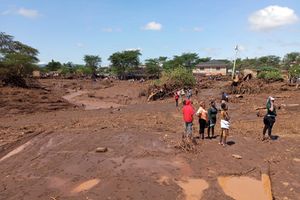No hope for survivors in ferry disaster
What you need to know:
- We will continue to look for bodies, but there is no hope any more of finding people alive, says police officer
ZANZIBAR, Tanzania, Sunday
Rescue teams resumed their search on Sunday for victims of the ferry disasters off Zanzibar, in which at least 193 people died, without hopes of finding any more survivors.
“We will continue to look for bodies, but there is no hope any more of finding people alive. We are looking for the bodies so they can be buried,” police spokesman Mohamed Mhina said.
Meanwhile Tanzania on Sunday began three days of national mourning for the victims of the tragedy, one of the worst maritime disasters in Africa in the past decade.
The ferry Spice Islander, reportedly with more than 800 people as well as cargo on board, capsized early on Saturday four hours into sailing between Unguja and Pemba, two of the three islands that make up Zanzibar, a semi-autonomous part of Tanzania.
Overloading is believed to have caused the disaster. Some angry survivors accused port and ferry officials of having ignored the protests of passengers that the boat was overcrowded.
Rescuers managed to pick up 612 survivors, officials said, but were forced to suspend their work as night fell. (IN PICTURES: Zanzibar ferry tragedy)
“Bodies which have been able to be identified yesterday have been buried, some of them during the night.
‘‘Those who could not be identified have been buried with dignity by the government,” Mr Mhina said, explaining that the rapidity of the burials was in accordance with Islam, the religon of the overwhelming majority of the population on Zanzibar.
He added that the morgue in the main hospital on Unguja, the biggest island in the archipelago, was not big enough to deal with a tragedy on this scale.
On Sunday morning inhabitants on Zanzibar were beginning to assemble in the Maisara stadium, where dozens of bodies were taken on Saturday so they could be identified, this time to mourn the victims.
A ceremony is being organised in the stadium to mark the start of three days of national mourning decreed by Tanzanian President Jakaya Kikwete.
State television TBC1 reported that the head of state had cancelled a three-day trip to Canada in the wake of the disaster.
The latest figures on passengers suggested more than 800 people were on board the doomed ferry, including families returning home after the holidays to celebrate the end of the Muslim holy month of Ramadhan.
The exact number of passengers on this type of ferry is often difficult to establish as no reliable passenger lists are kept. No foreigners have so far been reported amongst either the dead or rescued.
Tourism is the main foreign currency earner for Zanzibar, famed for its white-sand beaches and historical buildings in Stone Town, listed as a world heritage site by UNESCO, the United Nations cultural organisation.
Pemba lies some 80 kilometres northeast of Unguja.
But amid the grief, there were recriminations and anger that one of the worst maritime disasters in Africa in a decade could have been avoided if the ferry had not been patently overloaded, a fact acknowledged by the authorities.
“Most of these private boats (which ply the routes between the islands) are old and often overloaded but the authorities let it go on. If nothing changes this won’t be the last accident like this,” Mr Abdurahman Alawi warned, who had seven members of his family on the doomed ferry.
“Out of the seven, only my niece, a young girl, survived. She is in hospital now. We were able to identify another member of the family, who was buried during the night.
‘‘But with regard to the others, their bodies have not yet been recovered.”
Mr Zaid Amour, a 50-year-old survivor, put the blame squarely “on those who did not prevent the boat from leaving.
‘‘We were already protesting to the captain and other people in the port before we left saying the boat was too full”.
“Sailors on the boat were still telling us ‘it is ok’ when we were calling for life jackets, so when things got really bad it was too late for many people,” Mr Amour added.
The ferry was reportedly carrying a heavy cargo of rice and other goods. Rescue diver Ali Shante who arrived at scene some five hours after the ferry capsized said many of those rescued were “found floating using a mattress, wood and bags of rice.”




